After a long, long time with Streets of New Capenna, Dominaria United prerelease finally arrives next week. As always, it’s too early to say how each card and mechanic will perform—that’s what playing is for—but we also know enough to start analyzing them. With thirty years of Magic history, there is a lot of precedent that informs and inspires new designs. So today, we’ll take a sneak peek at the new mechanics in Dominaria United—where they came from, what they do, how they may perform, and what they suggest about future design.
Dominaria United introduces four new mechanics: Read Ahead, Enlist, Powerstone tokens, and Stun Counters (as well as returning mechanics Kicker and Domain, both of which originated in Invasion). To start, let’s begin with a twist on a very familiar mechanic, Read Ahead.
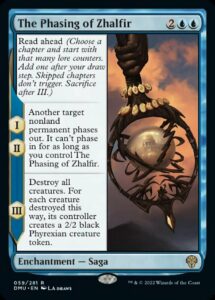
Delayed gratification no more
Sagas are awesome. We gushed about them just last week. The mechanic has an impressively large design space, only needing to gently innovate in its four iterations (number of chapters in THB, numbers of colors in KDH, and number of faces in NEO). I’d have imagined that needing to be coherent stories with synergistic chapters would restrict their possibility space tremendously, but Sagas are now annual features in Magic.
Magic’s latest twist is the first to fundamentally change how sagas function. The change is simple, but stark: which Read Ahead, you can start on whichever chapter you like. We’ll see how this changes the design constraints of Sagas soon enough. Presumably, every Read Ahead Saga has to be designed both as a Saga and as a sorcery that does its most powerful ability—there cannot be any Read Ahead Sagas that compensate for an undercosted ability with a time delay like Ascent of the Worthy, Phyrexian Scriptures or Song of Freyalise.
Read Ahead is an inverse of Kicker. Both provide options (also known as modality), but with very different heuristics (designer-speaker for rules of thumb). Kicker is a mana-smoothing mechanic where you can play the card both in the early game when mana is tight and in the late game where extra mana yields a bonus effect. With Read Ahead, there’s no smoothing—the card always costs the same, but you can always choose to skip effects to get to the one you want.
The feel is opposite: with Kicker, you pay more to get more; with Read Ahead, you get less to get what you want it faster. My gut says this isn’t as fun as Kicker and is instead more Spike-focused by providing modality for the sake of modality. This also has to constrain the mechanic’s design space since you can’t have weak early chapters like Medomai’s Prophecy. Both thoughts make me somewhat skeptical of Read Ahead.
But perhaps I’m comparing it to the wrong thing—it’s not an amplifying mechanic like Kicker, it’s a “choose one or more” design like Black Market Connections, Casualties of War, and Farewell, with just a bit of time delay.
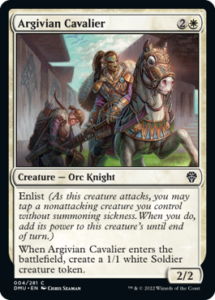
The new Banding on the block
Enlist is the big new mechanic in Dominaria United. It’s a mixture of Banding, one of Magic’s oldest and most confusing mechanics, and Exalted. Banding was a mediocre mechanic on offense and utterly dominant on defense. For years, Magic has created mechanics to recreate the feeling of creatures teaming up, and Exalted was one of the best. It was a purely offensive mechanic—a huge upgrade, since it’s better for games to end and players to engage in combat than it is for players to never be able to attack. Now, Enlist offers to bring that feeling of offensive cooperation back in a new way.
Just as Training was the mirror mechanic of Mentor, so too is Enlist the mirror of Exalted. Exalted creatures wanted to hang back, cheering as on their best champion attacked (ideally with First Strike, Vigilance, or Lifelink) while bolstered by their friends’ hopes and dreams. Enlist creatures do the opposite, jumping into the fray while their faithful squire attends to them.
Kill the attacking Exalted creature and all its Exalted friends are still waiting to crown another champion. Kill the Enlisting creature and its Enlist turns off. Moreover, Enlist doesn’t provide a toughness boost, so the creature is just as fragile as ever even when allied with Yargle, Gluttton of Urborg. Then again, Enlist always functions, while Exalted restricts you to making a single attack at once. All of that speaks to a bit of a weaker mechanic with probably a better play experience than Exalted.
The big question I have about Enlist is its wordiness. Five lines of reminder text is a lot. I think I get the gist of it—you have to actually give up an attack with a creature that could have attacked (barring shenanigans like Pacifism and Vigean Hydropon)—but still, it’s a mouthful. I’m curious how easy it’ll be for people to play with, especially in paper where you won’t have Arena reminding you that summoning sickness and Vigilance don’t mix with Enlist. Overall, it seems like a well designed mechanical concept, just we’ll see how potent and comprehensible it is once we get to play with it.
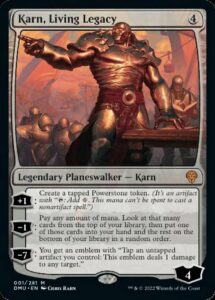
Clues, treasure, food, blood, and now powerstones
This mechanic only features on a single card, but sounds very likely to be in Brothers War, so we’ll briefly touch on it. I love artifact tokens and have wondered which new ones we’d see. There are only so many abilities that can be done at high volume, that don’t mess with combat math, and that strike the right balance of being appealing to use on their own or sacrificed to a Gluttonous Guest or Tempting Witch.
Powerstone tokens seem capable of threading this needle, and they do this by being a twist on Treasures (just like how Blood is a twist on Clues). Treasures are single-use, fix your mana, and can be used in all costs. Powerstones are multi-use, only provide colorless mana, and can’t be used on most costs. I like how Powerstones challenge you to find tricksy ways to use them (like filtering mana through a Prophetic Prism to ramp) or just be in artifact- and ability-heavy decks.
But let’s touch on the reading comprehension required here. I understand why it’s using a double negative, as you’d need more words to say “Add <>. This mana can be used to cast artifact spells and activate abilities.” and you’d lose functionality (like paying Morph costs or triggered abilities). But this wording strikes me like another Invasion callback, the baffling Dead Ringers.
By its nature as a card game that supports competition, Magic cards have to be written in consistent language that eliminates ambiguity at the tournament level. However, this Magic-ese has costs at every level, where cards cannot explain themselves in plain English (or your localization of choice). When Magic strays too far into Magic-ese, the game becomes harder to approach. I worry that between Powerstones and Enlist, Wizards may have accepted an unusually high level of reading comprehension and that we may see even more awkward wording in the future.
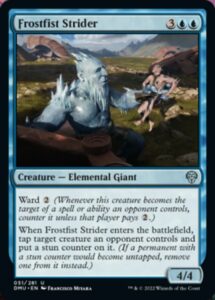
A Frost Breath by any other name would feel as cold
Finally, there are Stun Counters, the new mechanic that has been immediately upgraded to evergreen status. In theory, we may never again see Frost Breath, since stun counters will exist to make sure that players don’t accidentally (or “accidentally”) untap their stunned creatures. Stun Counters allow cards like Telekinesis to exist, they previously could not because there was no easy way to track such effects across multiple turn cycles.
Finally, Stun Counters have backwards-compatible affordances that rules-setters like Frost Breath did not—you can Hex Parasite a creature to wake it up or use Atraxa, Praetors’ Voice to permanently lock it down. That’s a lot going for them, making it unsurprising for Wizards to be excited enough to make it evergreen.
My first question is whether evergreen Stun Counters mean we’ll have a lot more punchout counters going forward. Magic has had a rule that if creatures can commonly have more than one type of counter placed on them (ability counters from IKO, shield counters from SNC) or a status needs to be tracked (exerting in AKH), then punchout counters are provided in booster packs. Most players use counters or dice to track +1/+1 counters, and it’s asking a lot to have them keep track of which loose change represents which type.
Thus far, I haven’t enjoyed playing with punchout counters in paper and am not super excited to do more of it, so perhaps we won’t have them and it’ll be fine. Besides, with so much Magic being played on digital, some added awkwardness to the tabletop play experience affects a smaller percentage of newer players.
My bigger question is whether Stun Counters might end up going the way of Skulk. Skulk came out in 2016’s Shadows over Innistrad and seemed poised to immediately jump to evergreen status as the long-awaited blue-black creature keyword. It then proved to have minimal design space (it does basically nothing on creatures with 3+ power) and to play poorly.
Stun Counters could play well—they might even give blue decent tempo removal that’s not Unsummon effects (imagine a card that stuns a creature for five turns, or a Wrath of God that taps and Stuns creatures for four turns). But also, we don’t see that much freezing in any given set. I’m not sure Magic is going to suddenly want to drastically increase the density enough to justify a new keyword (and possible punchout counters). I could be looking at this backward—the new mechanic adds affordances that future sets will be happy to have—but I wouldn’t be surprised if two years from now, we’re not seeing Stun counters anymore.
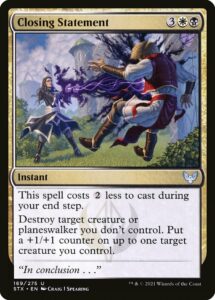
As we conclude, I recognize this article has more of a downer note to it than I’d have liked. Enlist is wordy, Powerstones are confusing, Read Ahead is too Spike-y, and Stun Counters are too ambitious. I admit part of this is likely some orneriness on my part due to the long, dry summer following Streets of New Capenna and my issues with that set. But I’ve also been spending plenty of time reviewing the latest Magic mechanics and have seen these concerns play out in recent sets (confusion with Cleave in VOW, Spikiness in several SNC mechanics, and wordiness in NEO sagas).
Perhaps I need to get with the times and acknowledge Wizards’ recognition that players have a higher capacity for dense mechanics, that digital Magic smooths out bits of mechanical awkwardness, and that only needing to be in one set allows for mechanics that could never fly under the block structure. But part of me feels that cards like Lagrella, the Magpie are mistakes. I worry that too much comprehensibility is being traded away for functionality, that too much wordiness and awkwardness has become acceptable. So, I’ll be keeping that in mind as I play with Dominaria United and its new mechanics, and I’ll keep doing so when we finally play with Powerstones at volume in Brothers War.
Until then, and as always, thanks for reading.
Zachary Barash is a New York City-based game designer and the last commissioner of Team Draft League. He designs for Kingdom Death: Monster, has a Game Design MFA from the NYU Game Center, and does freelance game design. When the stars align, he streams Magic (but the stars align way less often than he’d like).

